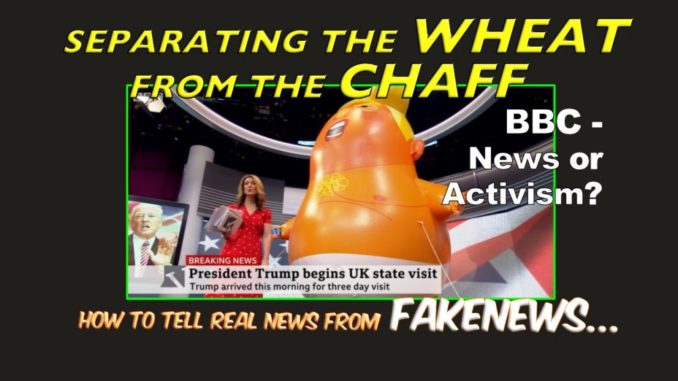
Had I been the Starship Enterprise on Monday 3rd June 2019, Scotty would have said “…she can nae take n’more Captain!”. As it happens, warp factor 10 was not attained and the engines were switched off before they blew. But I was not the Starship Enterprise. I was boldly going where plenty have gone before: to listen to the BBC coverage of the State Visit of US President. For my own mood’s sake, I didn’t indulge for long. Off switch!
The BBC editorial choices during the state visit were bizarre, even by BBC standards. From the choice of Simon Schama, the well-known vitriolic Trump hater to provide negative narrative, to the replica blow up trump effigy in the BBC studio, listeners and viewers have been fed presumptuous and often pompous badmouthing of the President by a smorgasbord of likeminded co-hosts, comfortable in their chummy contempt. Bizarre impoliteness. Un-British. Many more people are seeing that chatter on the BBC and the smears about Trump don’t add up and feel as though they’re being spun a yarn – though what yarn, and why, is not clear. As with many families in this era of the UK’s (prolonged) departure from the EU, much discourse on domestic and international happenings with Brexit and with Trump has been aired in the Dalton households. Who can escape it? During one such discussion, I was asked by a family member the following question having watched a BBC News item: “How do you know what news is real and what news is not real?” A good question. Not an easy one for anyone to answer.
So? How do you know what is real and what isn’t?
It is easy to provide a cynical answer to this question – don’t believe anything! Ultimately, this is not helpful. Always retaining a healthy dose of scepticism is helpful, but cynicism is not. Firstly, no one is infallible and anyone can be taken in by false news. I have considered what simple tips can be applied in spotting serious news amongst the propaganda. I hope the reader finds these thoughts of use, some of which I share:
- Typically the purpose of a news report is to shape the thoughts of you the listener to believe whatever it is that is deemed preferable by that particular broadcaster for you to believe, rather than to inform you. Consider in any report the time taken to give known facts of who, what, where and when. Consider other time spent on ‘why’: speculation; he-said she-said; ‘expert’ opinion etc. (Rarely, reporters are committed to inform you of truth as best they can, though such reporters find it difficult to get work with major networks) – Top tip: scrutinise individual journalists rather than make sweeping judgements on networks.
- Watch out for ‘Community Leaders’ who are not elected representatives. Self-proclaimed ‘Community Leaders’ are used by broadcasters for emotional effect. They are almost always props being used to push public opinion toward a counter-narrative and develop a positive sentiment to suit a political end. Top-tip: When unelected ‘Community Leader’ starts speaking, stop listening.
- ‘Sources say’ implies that certain political forces want you to believe the message and gain political pole climbing advantage. Usually ‘sources say’ news reports are an attempt to frame one individual or party positively and another not – Top tip – for any reporter or broadcaster, see if there are patterns in who is favoured/damaged by what their ‘sources say’.
- Personal attacks. Everybody has said something that can be misconstrued, reinterpreted or clumsily worded. The more people publicly converse, the more often this will occur. When interviewers refer back to historic quotes, especially from years ago, they are not extracting information or seeking the explanation of views or opinions, they are shaping the viewers emotions to react negatively toward the interviewee. All political interviews are one sided battles. The skilled interviewer has the weaponry to assist or demonise an interviewee. Top Tip: If an interviewer focuses on ideas and content – stick with them. If an interviewer refers to ‘historic quotes’ especially in reference to the key crimes of ‘racism’, ‘homophobia’, ‘Islamophobia’, ‘misogyny’ then ditch (and mock) the interviewer.
- Predictive News. Any news predicting that Person(s) ‘A’ is/are about to announce or do ‘x’ – find a pinch of salt! It could be true, but it could be part of real time political posturing. Especially used to promote ‘demonstrations’ and ‘protests’ designed to push a political narrative. Top-tip: Any report of chemical weapons attacks which are about to be committed, take a handful of salt especially where it comes to an apportionment of guilt.
- Presumption of guilt. Another symptom of Trump Derangement Syndrome and its sufferers is the upsidedownification of the presumption of innocence, the bedrock of our civil society. Top-tip: Any reporter, newscaster, journalist who determines Person ‘A’ has not been proven innocent of allegation ’x’ – mock and reprimand said reporter.
- Double Standards – overt interview bias, “Shoe on the other foot test” … … When it comes to political reporting a most productive test is to apply the “Shoe on the other foot test”. Simply put, in terms of tone, politeness, aggression/friendliness, body language, question choice, interruption frequency – whatever characteristic of the interviewer consider the following – if the interviewee were from Party ‘x’ or party ‘y’, would and does the interviewer adopt the same approach? Top-tip: Stick with interviewers who apply one standard.
Currently, Donald Trump, the anti-politician elected by the people for the people, who swore his Presidential Oath in January 2017, is proving to be having a seismic effect on world politics and the mainstream media is crumbling in the aftershocks. As predicted at the time…
“‘A Political Earthquake’, a phrase coined by Nigel Farage, the Nostradamus of our times, is about to get noticed. Whilst campaigning to leave the EU and since that magnificent sunrise on 24th June 2016, as well as domestic and other international politics I have followed, closely, the rise of Donald J Trump from maverick joke candidate through to President Elect. It has been fascinating. One of the fascinations has been the actions and reactions of the Mainstream Media. Their political seismographs appear to be malfunctional. I suggest their moral compasses are also in need of recalibration which is the most disturbing aspect of this particular fascination, but I shall leave the morality (or lack thereof) in the media for another time.”
Through their coverage of Donald Trump, the mainstream media have proven over the last three years, beyond doubt, that they have no wish to separate the wheat from the chaff. Morality doesn’t come into it – it’s all about power and money. Trump and Farage are the libertarian wheat: positive, energetic, open, bright, optimistic, ‘can-do’ visionaries. The authoritarian chaff is the LibLabCon sewer of Westminster and the Washington Swamp: negative, low energy, pessimistic, subservient, closed, shadowy, compliant incompetents.
We need to change politics for good and we need a return of openness, diligence and truthfulness to journalism and public life.
© Councillor James Dalton 2019, DVP – The Direct Democracy Party. dvparty.uk
The Goodnight Vienna Audio file
Audio Player



